The dictatorship of the bankers and their debt-money system are not limited to one country, but exist in every country in the world. They are working to keep their control tight, since one country freeing itself from this dictatorship and issuing its own interest- and debt-free currency, setting the example of what an honest system could be, would be enough to bring about the worldwide collapse of the bankers’ swindling debt-money system.
This fight of the International Financiers to install their fraudulent debt-money system has been particularly vicious in the United States of America since its very foundation, and historical facts show that several American statesmen were well aware of the dishonest money system the Financiers wanted to impose upon America and of all of its harmful effects. These statesmen were real patriots, who did all that they possibly could to maintain for the USA an honest money system, free from the control of the Financiers. The Financiers did everything in their power to keep in the dark this facet of the history of the United States, for fear that the example of these patriots might still be followed today. Here are some facts that the Financiers would like the population not to know:
 Benjamin Franklin Benjamin Franklin |
We are in 1750. The United States of America does not yet exist; it is the 13 Colonies of the American continent, forming "New England", a possession of the motherland, England. Benjamin Franklin wrote about the population of that time: "Impossible to find a happier and more prosperous population on all the surface of the globe." Going over to England to represent the interests of the Colonies, Franklin was asked how he accounted for the prosperous conditions prevailing in the Colonies, while poverty was rife in the motherland:
"That is simple," Franklin replied. "In the Colonies we issue our own money. It is called Colonial Scrip. We issue it in proper proportion to make the products pass easily from the producers to the consumers. In this manner, creating ourselves our own paper money, we control its purchasing power, and we have no interest to pay to no one."
The English bankers, being informed of that, had a law passed by the British Parliament prohibiting the Colonies from issuing their own money, and ordering them to use only the gold or silver debt-money that was provided in insufficient quantity by the English bankers. The circulating medium of exchange was thus reduced by half.
"In one year," Franklin stated, "the conditions were so reversed that the era of prosperity ended, and a depression set in, to such an extent that the streets of the Colonies were filled with unemployed."
Then the Revolutionary War was launched against England, and was followed by the Declaration of Independence in 1776. History textbooks erroneously teach that it was the tax on tea that triggered the American Revolution. But Franklin clearly stated:
"The Colonies would gladly have borne the little tax on tea and other matters, had it not been the poverty caused by the bad influence of the English bankers on the Parliament: which has caused in the Colonies hatred of England, and the Revolutionary War."
The Founding Fathers of the United States, bearing all these facts in mind, and to protect themselves against the exploitation of the International Bankers, took good care to expressly declare, in the American Constitution, signed at Philadelphia in 1787, Article 1, Section 8, paragraph 5:
"Congress shall have the power to coin money and to regulate the value thereof."
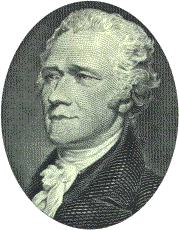 Alexander Hamilton Alexander Hamilton |
But the bankers did not give up. Their agent, Alexander Hamilton, was named Secretary of Treasury in George Washington’s cabinet, and advocated the establishment of a federal bank to be owned by private interests, and the creation of debt-money with false arguments like: "A national debt, if it is not excessive, will be to us a national blessing... The wisdom of the Government will be shown in never trusting itself with the use of so seducing and dangerous an expedient as issuing its own money." Hamilton also made them believe that only the debt-money issued by private banks would be accepted in dealing abroad.
Thomas Jefferson, the Secretary of State, was strongly opposed to that project, but President Washington was finally won over by Hamilton’s arguments. A federal bank was thus created in 1791, the "Bank of the United States", with a 20 years’ charter. Although it was termed "Bank of the United States", it was actually the "bank of the bankers", since it was not owned by the nation, but by individuals holding the bank’s stocks, the private bankers. This name of "Bank of the United States" was purposely chosen to deceive the American population and to make them believe that they were the owners of the bank, which was not the case. The charter for the Bank of the United States ran out in 1811, and Congress voted against its renewal, thanks to the influence of Thomas Jefferson and Andrew Jackson:
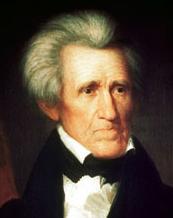 Andrew Jackson Andrew Jackson |
“If Congress," Jackson said, "has a right under the Constitution to issue paper money, it was given them to use by themselves, not to be delegated to individuals or corporations."
Thus ended the history of the first Bank of the United States. But the bankers did not play their last card.
Nathan Rothschild, of the Bank of England, issued an ultimatum: "Either the application for the renewal of the charter is granted, or the United States will find itself involved in a most disastrous war." Jackson and the American patriots did not believe the power of the international moneylenders could extend so far. "You are a den of thieves-vipers," Jackson told them. "I intend to rout you out, and by the Eternal God, I will rout you out!" Nathan Rothschild issued orders: "Teach these impudent Americans a lesson. Bring them back to Colonial status."
The British Government launched the War of 1812 against the United States. Rothschild’s plan was to impoverish the United States through this war to such an extent that the legislators would have to seek financial aid... which, of course, would be forthcoming only in return for the renewal of the charter for the Bank of the United States. Thousands were killed, but what does that matter to Rothschild? He had achieved his objective; the U.S. Congress granted the renewal of the Charter in 1816.
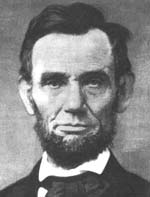 Abraham Lincoln Abraham Lincoln |
Abraham Lincoln was elected President of the United States in 1860, under the promise of abolishing the slavery of the blacks. Eleven southern States, favourable to the human slavery of the black race, then decided to secede from the Union, to withdraw from the United States of America: that was the beginning of the Civil War (1861-1865). Lincoln, being short of money to finance the North’s war effort, went to the bankers of New York, who agreed to lend him money at interest rates varying from 24 to 36 percent. Lincoln refused, knowing perfectly well that this was usury and that it would lead the United States to ruin. But his money problem was still not settled!
His friend in Chicago, Colonel Dick Taylor, came to his rescue and put the solution to him: "Just get Congress to pass a bill authorizing the printing of full legal tender treasury notes, and pay your soldiers with them, and go ahead and win your war with them also."
This is what Lincoln did, and he won the war: between 1862 and 1863, in full conformity with the provisions of the U.S. Constitution, Lincoln caused $450 million of debt-free Greenbacks to be issued, to conduct the Civil War. (These Treasury notes were called "Greenbacks" by the people because they were printed with green ink on the back.)
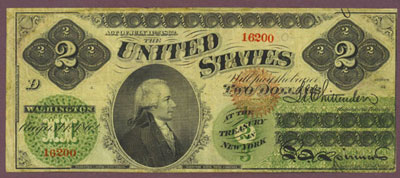
Lincoln said: "Government, possessing the power to create and issue currency and credit as money, and enjoying the right to withdraw both currency and credit from circulation by taxation and otherwise, need not and should not borrow capital at interest as the means of financing governmental work and public enterprise… The privilege of creating and issuing money is not only the supreme prerogative of Government, but it is the Government’s greatest creative opportunity."
Lincoln called the Greenbacks "the greatest blessing the American people have ever had." A blessing for all, except for the bankers, since it was putting an end to their racket, to the theft of the nation’s credit and issuing interest-bearing money. So they did everything possible to destroy these Greenbacks and sabotage Lincoln’s work. Lord Goschen, spokesman of the Financiers, wrote in the London Times (Quote taken from Who Rules America by C. K. Howe, and reproduced in Lincoln Money Martyred by Dr. R. E. Search):
"If this mischievous financial policy, which has its origin in North America, shall become indurated down to a fixture, then that Government will furnish its own money without cost. It will pay off debts and be without a debt. It will have all the money necessary to carry on its commerce. It will become prosperous without precedent in the history of the world. That Government must be destroyed, or it will destroy every monarchy on the globe." (The monarchy of the money lenders.)
First, in order to cast discredit on the Greenbacks, the bankers persuaded Congress to vote, in February of 1862, the "Exception Clause", which said that the Greenbacks could not be used to pay the interest on the national debt, nor to pay taxes, excises, or import duties. Then, in 1863, having financed the election of enough Senators and Representatives, the bankers got the Congress to revoke the Greenback Law in 1863, and enact in its place the National Banking Act. (Money was then to be issued interest-bearing by privately-owned banks.)
This Act also provided that the Greenbacks should be retired from circulation as soon as they came back to the Treasury in payment of taxes. Lincoln heatedly protested, but his most urgent objective was to win the war and save the Union, which obliged him to put off till after the war the veto he was planning against this Act and the action he was to take against the bankers. Lincoln nevertheless declared:
"I have two great enemies, the Southern army in front of me and the bankers in the rear. And of the two, the bankers are my greatest foe."
Lincoln was re-elected President in 1864, and he made it quite clear that he would attack the power of the bankers, once the war was over. The war ended on April 9, 1865, but Lincoln was assassinated five days later, on April 14. A tremendous restriction of credit followed, organized by the banks: the currency in circulation in the country, which was, in 1866, $1,907 million, representing $50.46 for each American citizen, had been reduced to $605 million in 1876, representing $14.60 per capita. The result: in ten years, 56,446 business failures, representing a loss of $2 billion. And as if this was not enough, the bankers reduced the per capita currency in circulation to $6.67 in 1887!
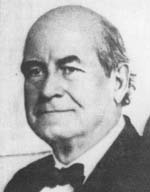 William Jennings Bryan William Jennings Bryan |
Lincoln’s example nevertheless remained in several minds, as far along as 1896. That year, the Presidential candidate for the Democrats was William Jennings Bryan, and once again, history textbooks tell us that it was a good thing that he did not succeed in his bid for the Presidency, since he was against the bankers’ "sound money", the money issued as a debt, and against the gold standard. Bryan said:
"We say in our platform that we believe that the right to coin and issue money is a function of Government. We believe it. Those who are opposed to it tell us that the issue of paper money is a function of the bank, and that the Government ought to get out of the banking business. I tell them that the issue of money is a function of Government, and that the banks ought to get out of the Government business... When we have restored the money of the Constitution, all other necessary reforms will be possible, but until this is done, there is no other reform that can be accomplished."
Finally, on December 23, 1913, the U.S. Congress voted in the Federal Reserve Act, which took away from Congress the power to create money, and which handed over this power to the Federal Reserve Corporation. One of the rare Congressmen who had understood all the issue at stake in this Act, Representative Charles A. Lindbergh Sr. (Rep-Minnesota), father of the famous aviator, said:
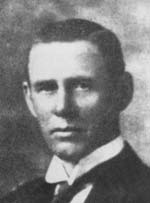 Charles A. Lindbergh Charles A. Lindbergh |
"This Act establishes the most gigantic trust on earth. When the President (Wilson) signs this bill, the invisible government of the Monetary Power will be legalized... The worst legislative crime of the ages is perpetrated by this banking and currency bill."
What allowed the bankers to finally obtain the complete monopoly of the control of credit in the United States? The ignorance among the population of the money question. John Adams wrote to Thomas Jefferson, in 1787:
"All the perplexities, confusion and distress in America arise, not from defects in the Constitution, not from want of honor or virtue, so much as downright ignorance of the nature of coin, credit, and circulation."
Lincoln’s Secretary of Treasury, Salmon P. Chase, stated publicly, shortly after the passage of the National Banking Act, in 1863:
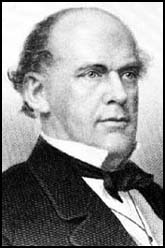 Salmon P. Chase Salmon P. Chase |
"My agency in promoting the passage of the National Banking Act was the greatest financial mistake of my life. It has built up a monopoly which affects every interest in the country. It should be repealed, but before that can be accomplished, the people will be arrayed on one side, and the banks on the other, in a contest such as we have never seen before in this country."
Automobile manufacturer Henry Ford said:
"If the people of the nation understood our banking and monetary system, I believe there would be a revolution before tomorrow morning."
The education of the people, that’s the solution! It is precisely the method advocated by the "Michael" Journal: to build a force in the people through education, so that the sovereign government of each nation will have the courage to stand up to the bankers and issue its own money, as President Lincoln did. If only all those in favour of an honest money system understood their responsibilities for spreading the "Michael" Journal! Social Credit, which would establish an economy where everything is organized to serve the human person, is precisely aiming to develop personal responsibility, to create responsible people. Each mind won over to Social Credit is an advance. Each person formed by Social Credit is a force, and each force acquired is a step towards the victory. And for the last seventy years, how many forces have been acquired!… If all of them were active, it is really before tomorrow morning that we would obtain the implementation of the Social Credit proposals!
As Louis Even wrote in 1960: "The obstacle is neither the financier, nor the politician, nor any avowed enemy. The obstacle lies in the passivity of too many Social Crediters who hope for the coming of the triumph of the Cause, but who leave it up to others to promote it."
In short, it is our refusal to take on our responsibilities that delays the implementation of Social Credit, of an honest money system. "Much will be asked of the man to whom much has been given" (Luke 12:48). Examine your consciences, dear Social Crediters; personal conversion, one more step, let us take on our responsibilities: the victory has never been so close! Our responsibility is to make Social Credit known to others, by having them subscribe to the "Michael" Journal, the only publication that makes this brilliant solution known.
It is the education of the people that is necessary. Once the pressure from the public is strong enough, all the parties will agree with it. A fine example of this can be found in the Goldsborough bill of 1932, which was described by an author as a "Social Credit bill" and "the closest near-miss monetary reform for the establishment of a real sound money system in the United States":
"An overwhelming majority of the U.S. Congress (289 to 60) favored it as early as 1932, and in one form or another it has persisted since. Only the futile hope that a confident new President (Roosevelt) could restore prosperity without abandoning the credit-money system America had inherited kept Social Credit from becoming the law of the land. By 1936, when the New Deal (Roosevelt’s solution) had proved incapable of dealing effectively with the Depression, the proponents of Social Credit were back again in strength. The last significant effort to gain its adoption came in 1938." (W.E. Turner, Stable Money, p. 167.)
Even the dividend and the compensated discount, two essential parts of Social Credit, were mentioned in this bill, which was the "Goldsborough bill", after the Democratic Representative of Maryland, T. Allan Goldsborough, who presented it in the House for the first time on May 2, 1932.
Two persons who supported the bill especially hold our attention: Robert L. Owen, Senator of Oklahoma from 1907 to 1925 (a national bank director for 46 years), and Charles G. Binderup, Representative of Nebraska. Owen published an article, in March of 1936, in J. J. Harpell’s publication, "The Instructor", of which Louis Even was the assistant editor. As for Binderup, he gave several speeches on radio in the USA during the Depression, explaining the damaging effects of the control of credit by private interests.
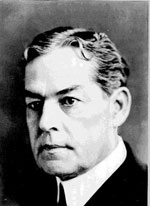 Robert Owen Robert Owen |
Robert Owen testified in the House, April 28, 1936: "...the bill which he (Goldsborough) then presented, with the approval of the Committee on Banking and Currency of the House — and I believe it was practically a unanimous report. It was debated for two days in the House, a very simple bill, declaring it to be the policy of the United States to restore and maintain the value of money, and directing the Secretary of the Treasury, the officers of the Federal Reserve Board, and the Reserve banks to make effective that policy. That was all, but enough, and it passed, not by a partisan vote. There were 117 Republicans who voted for that bill (which was presented by a Democrat) and it passed by 289 to 60, and of the 60 who voted against it, only 12, by the will of the people, remain in the Congress.
"It was defeated by the Senate, because it was not really understood. There had not been sufficient discussion of it in public. There was not an organized public opinion in support of it."
Once again, education is the main issue: Republicans and Democrats alike supported it, so there was no need for a third party or any sort of "Social Credit" party. Moreover, Owen admitted that the only thing that was lacking was the education of the population, a force among the people. That confirms the method used by the "Michael" Journal, advocated by Clifford Hugh Douglas and Louis Even.
The Goldsborough bill was titled: "A bill to restore to Congress its Constitutional power to issue money and regulate the value thereof, to provide monetary income to the people of the United States at a fixed and equitable purchasing power of the dollar, ample at all times to enable the people to buy wanted goods and services at full capacity of the industries and commercial facilities of the United States... The present system of issuing money through private initiative for profit, resulting in recurrent disastrous inflations and deflations, shall cease."
The bill also made provision for a discount on prices to be compensated to the retailer, and for a national dividend to be issued, beginning at $5 a month (in 1932) to every citizen of the nation. Several groups testified in support of the bill, stressing the bill provided the means of controlling inflation.
The most ardent opponent in the Senate was Carter Glass, a fierce partisan of the Federal Reserve (private control of money) and a former Secretary of the Treasury. Besides, Henry Morgenthau, then Roosevelt’s Secretary of Treasury, who was strongly opposed to any monetary reform, said that Roosevelt’s New Deal should be given a trial first.
What mostly helped the opponents to the bill was the near ignorance of the money question among the population... and even in the Senate.
Some Senators, knowing nothing about the creation of money (credit) by banks, exclaimed: "The Government cannot create money like that! That will cause runaway inflation!" And others, while admitting the necessity for debt-free money, questioned the necessity for a dividend, or the compensated discount. But all these objections actually disappear after a serious study of Social Credit.
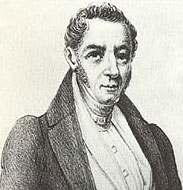 Mayer Amschel Rothschild Mayer Amschel Rothschild |
"Let me issue and control a nation’s money and I care not who writes its laws." — Mayer Amschel Rothschild (1744-1812), founding father of international finance.
"History records that the money changers have used every form of abuse, intrigue, deceit, and violent means possible to maintain their control over governments by controlling money and its issuance." — US President James Madison.
"The money power denounces, as public enemies, all who question its methods or throw light upon its crimes." — William Jennings Bryan.
"Whoever controls the volume of money in any country is absolute master of all industry and commerce." — US President James A. Garfield.
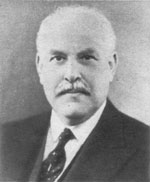 Josiah Stamp Josiah Stamp |
"Banking was conceived in iniquity and born in sin. Bankers own the earth. Take it away from them, but leave them the power to create money and control credit, and with the flick of a pen, they will create enough money to buy it back again. Take this great power away from the bankers and all the great fortunes like mine will disappear, and they ought to disappear, for this would be a better and happier world to live in. But if you want to continue the slaves of bankers and pay the cost of your own slavery, let them continue to create money and to control credit." — Sir Josiah Stamp, Director, Bank of England, 1940.
"The process by which banks create money is so simple that the mind is repelled." — John K. Galbraith, in "Money: Whence it came, where it went", p. 29.
"The banks do create money. They have been doing it for a long time, but they didn’t quite realise it, and they did not admit it. Very few did. You will find it in all sorts of documents, financial textbooks, etc. But in the intervening years, and we must all be perfectly frank about these things, there has been a development of thought, until today I doubt very much whether you would get many prominent bankers to attempt to deny that banks create credit." — H. W. White, Chairman of the Associated Banks of New Zealand, to the New Zealand Monetary Commission, 1955.
Let us bring an end to this lesson with the quotations of two great American citizens.
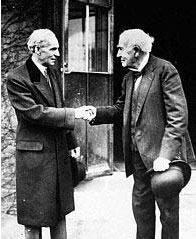 Thomas Edison and Henry Ford Thomas Edison and Henry Ford |
Thomas Edison: "Throughout our history some of America’s greatest men have sought to break the Hamiltonian imprint (Alexander Hamilton’s debt-money policy) on our monetary policy in order to substitute a stable money supply measured to the nation’s physical requirements. Lack of public and official understanding, combined with the power of banking interests who have imagined a vested interest in the present chaotic system, have so far thwarted every effort.
"Don’t allow them to confuse you with the cry of `paper money.’ The danger of paper money is precisely the danger of gold — if you get too much it is no good. There is just one rule for money and that is to have enough to carry on all the legitimate trade that is waiting to move. Too little and too much are both bad. But enough to move trade, enough to prevent stagnation, on the one hand, not enough to permit speculation, on the other hand, is the proper ratio...
"If the United States will adopt this policy of increasing its national wealth without contributing to the interest collector — for the whole national debt is made up of interest charges — then you will see an era of progress and prosperity in this country such as could never have come otherwise."
And a call from Henry Ford: "The youth who can resolve the money question will do more for the world than all the professional soldiers of history."
| Previous chapter - Men of the Right, Empty-Handed | Next chapter - Social Credit in the United States in 1932 |
Comments (1)
Coy Cates
Reply